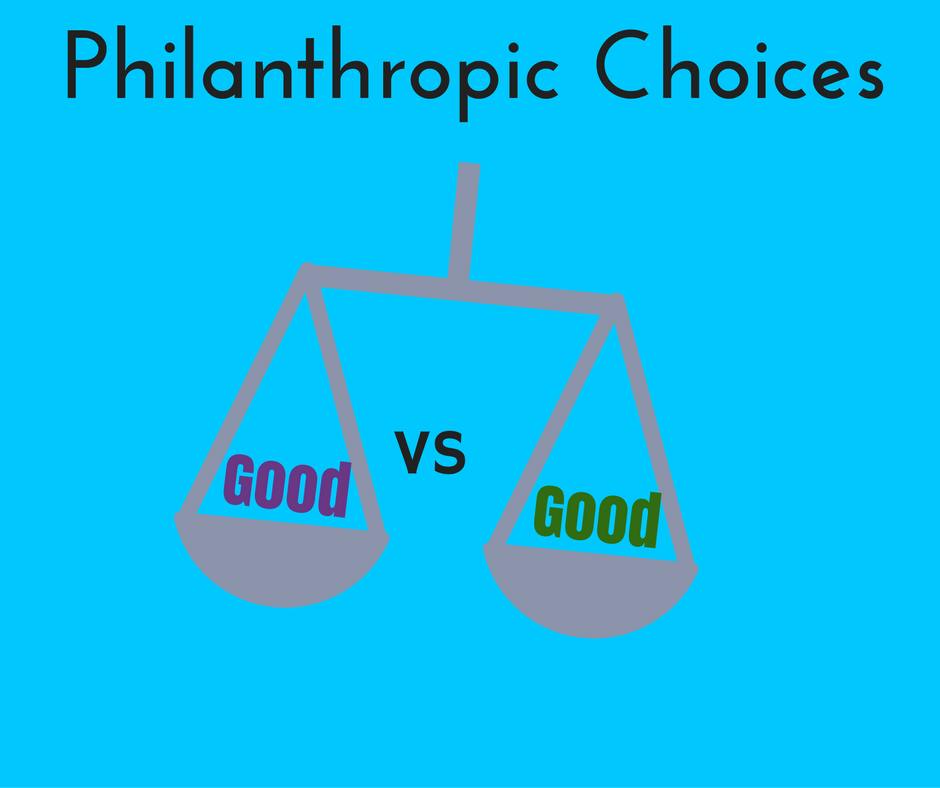
Philanthropic Choices: Good vs. Good
By Betsy Buchalter Adler, Board member Community Foundation for Monterey County, Principal Adler & Colvin (retired), Trustee and Program Officer, Claire Giannini Fund
Good vs Good
Imagine that you’re walking down Alvarado Street in downtown Monterey, on your way to get some coffee. You’ve got a nice crisp $5 bill in your pocket; you can easily afford a large pumpkin spice latte. But then you see a homeless woman sitting on the sidewalk ahead of you. You also know that there’s a donation box for a local charity inside the coffee shop.
Decisions for Good
How will you spend your $5 – the latte, the homeless woman, the donation box? None of those choices are inherently bad.
How do
you choose among competing good options? That’s the challenge at the heart of philanthropy.”
Those of us who are lucky enough to be able to give time or money to help others must still decide where our time and money should go. Before we even get to how much we’re going to give, or what giving vehicle works best for us, we are faced with the dilemma that I’m calling “good vs. good.”
Giving Your Money/Giving Your Time
 In their book “Give Smart: Philanthropy that Gets Results” Joel Fleishman and Tom Tierney describe a friend who said he had supported 167 organizations in the previous year. When they asked how many of them were causes to which he would have given his time and energy as well as his money, he answered, “You could count those on the fingers of one hand.”
In their book “Give Smart: Philanthropy that Gets Results” Joel Fleishman and Tom Tierney describe a friend who said he had supported 167 organizations in the previous year. When they asked how many of them were causes to which he would have given his time and energy as well as his money, he answered, “You could count those on the fingers of one hand.”
Those words hit close to home. Our family’s giving list was a lot shorter than his, but we hadn’t taken a fresh look at it in far too long. It was time to pay some real attention to our giving. Does this sound familiar?
I believe that intentional philanthropy – whether we’re talking about a million-dollar gift from people whose reasons you can read at www.givingpledge.org or a $500 gift from my family’s donor-advised fund at CFMC – works best when we start with a thoughtful look at why we are giving in the first place.”– Betsy Buchalter Adler
4 Questions to Ask
As you approach your year-end giving, here are some questions that you might find useful in sorting out your own good vs. good choices:
1) Why are you giving?
Maybe it’s a general sense of gratitude: you’ve done better than you hoped and you feel like you should share. Maybe it’s specific gratitude: you want to thank your school, or your children’s school, or the hospital that took good care of you or a loved one.
Maybe you know what it’s like to struggle economically, so you want to support charities that provide direct services to people in need.
Maybe you are passionate about environmental preservation, or music and art, or social justice, or animals. You might want to help people close to home, or you might feel that your dollars will go further and help more people in Africa or Asia.
What matters most to you, and why does it matter so much?
2) What DON’T you want to support?
Saying no is every bit as important as saying yes, but often harder to do. Once you have a clearer sense of what beliefs and values motivate you to give, you’ll find it less difficult to sort those year-end charity appeals into “yes,” “maybe,” and “recycle bin.”
3) How effective will this gift be?
Most of us are not in a position to make gifts that are big enough to measure in terms of effectiveness. But we can look at how effective a charity is, before we send them our check. The Community Foundation for Monterey County can help you find information on the effectiveness of the charities you’re interested in.
4) Am I giving because the cause is important to me, or am I giving out of habit, or because somebody asked me to give and I don’t want to say no?
Let’s assume that a particular gift is to a charity that will do good work and will spend the money wisely. Is this really what you want to do, or are there other equally effective charities that you feel more strongly about supporting?
There are no wrong answers here — just a wonderful variety of good ones.
Resources
- More than 150 individuals and couples have committed at least half their net worth to charity and taken the “Giving Pledge“.
- The Atlantic senior editor Derek Thompson wrestles with the approach known as “effective altruism” as he tries to decide how to make a significant charitable gift in memory of his mother.
- The Bill and Melinda Gates Foundation explains what it does and does not support and why.
- How the Community Foundation for Monterey County selects local organizations for Community Impact grants.
- You want to support veterans, yet there are hundreds of charities that claim to do so. A New York Times article explores “How do you choose among them”?
Further Reading
- “Give Smart: Philanthropy that Gets Results”
- William MacAskill, Doing Good Better: How Effective Altruism Can Help You Make a Difference
- Kentaro Toyama, Geek Heresy: Rescuing Social Change from the Cult of Technology
- Julie Salamon, Rambam’s Ladder: A Meditation on Generosity and Why It Is Necessary to Give
Learn More
For information about developing your own philanthropic vision, how to start a donor advised fund or other giving options, contact Christine Dawson, CFMC Vice President of Philanthropic Services at 831.375.9712 x126
